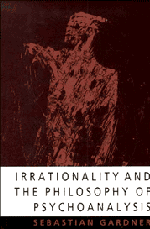Book contents
- Frontmatter
- Contents
- Acknowledgements
- Note on the text
- Introduction
- PART I DIVIDING PERSONS
- PART II PSYCHOANALYTIC CONCEPTS
- 4 Unconscious motives and Freudian concepts
- 5 Wish
- 6 Phantasy and Kleinian explanation
- PART III PSYCHOANALYTIC CONCEPTION OF MIND
- Appendices
- Notes
- Works of Freud cited
- Bibliography
- Index
4 - Unconscious motives and Freudian concepts
Published online by Cambridge University Press: 21 October 2009
- Frontmatter
- Contents
- Acknowledgements
- Note on the text
- Introduction
- PART I DIVIDING PERSONS
- PART II PSYCHOANALYTIC CONCEPTS
- 4 Unconscious motives and Freudian concepts
- 5 Wish
- 6 Phantasy and Kleinian explanation
- PART III PSYCHOANALYTIC CONCEPTION OF MIND
- Appendices
- Notes
- Works of Freud cited
- Bibliography
- Index
Summary
Our Prince, suddenly and for no reason at all, committed two or three shocking outrages on various persons. The striking thing about them was that they were so utterly shocking, so unlike anything anyone could have expected, not at all what usually happens, absolutely idiotic and puerile, committed goodness only knows why, without rhyme or reason.
DostoyevskyThe mind of man is capable of anything – because everything is in it, all the past as well as all the future.
Conrad‘RADICAL HETEROGENEITY’
Part II will set out the basic concepts of psychoanalytic theory. The relation of psychoanalytic theory to ordinary psychology is not easy to describe accurately. On the one hand, it will be stressed that psychoanalytic concepts are natural extensions of the ways of thinking of ordinary psychology. This extension is independent from the line of reasoning that leads to the unconscious being conceived as a Second Mind – making the Censor Criticism irrelevant to psychoanalytic theory. On the other hand, psychoanalytic theory is not just a terminological reformulation of ordinary psychology: it explains things that ordinary psychology can not explain, and does so by employing a distinctive form of explanation which is foreign to ordinary psychology. This second claim is well expressed in the following passage:
In Sartre, for instance, the critique of the psychoanalytic unconscious misconstrues the latter's radical heterogeneity by reducing unconscious contents to the misunderstood fringes and implications of present intention […] The questions thus posed (bad faith, conscious reticence, misunderstanding-pathology of of the field of consciousness, etc.) […] we characterise […] as marginal in relation to a domain which is properly psychoanalytic.
- Type
- Chapter
- Information
- Irrationality and the Philosophy of Psychoanalysis , pp. 87 - 119Publisher: Cambridge University PressPrint publication year: 1993



